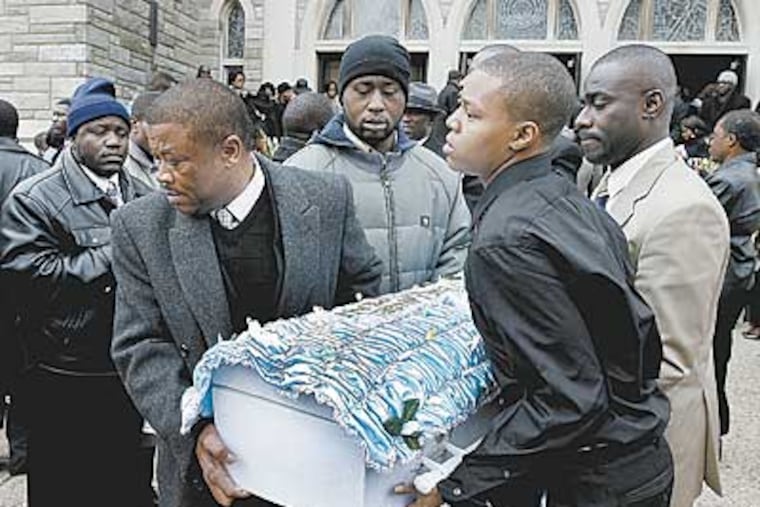A world of grieving for 7 victims of fire
A massive seven-casket funeral for the victims of the devastating, day-after-Christmas house fire in Southwest Philadelphia yesterday brought together more than 1,500 mourners, including elected officials, Liberia's ambassador to the United States, and West African immigrants from throughout the East Coast for a somber day of bitter cold, knee-buckling grief and tender recollection.

A massive seven-casket funeral for the victims of the devastating, day-after-Christmas house fire in Southwest Philadelphia yesterday brought together more than 1,500 mourners, including elected officials, Liberia's ambassador to the United States, and West African immigrants from throughout the East Coast for a somber day of bitter cold, knee-buckling grief and tender recollection.
Divine Mercy Parish, in the 6600 block of Chester Avenue, overflowed with raw emotion as a seemingly endless stream of well-wishers trooped past the open coffins arranged at the head of the church. In front of the tiny coffin of the youngest victim, Zyhire Wright-Teah, 18 months, many mourners wailed and some collapsed.
Some wore traditional African dress, including bright hair ties shot through with golden threads and simple robes. Most wore jet-black finery beneath tear-streaked faces.
"We are a close-knit community and believe in extended family. So your problem is my problem," said Liberian-born Berma Findley, who was among the representatives of her church, Freedom Christian Fellowship in Dover, Del.
"We do have the village concept in our society. It takes a village to raise a child," said Mator Kpangai, a high school principal from Providence, R.I., and interim president of the Union of Liberian Associations in the Americas. "When one of our family has a tragedy we have to come."
The fast-moving fire started in the basement of a brick twin after a kerosene heater was mishandled and exploded. It took the lives of Zyhire; his father, Elliott Teah, 23; Teah's sisters, Vivian, 25, and Jennifer, 17; and Zyhire's brother and sister, Ramere Wright-Dosso, 8, and Mariam Wright-Dosso, 6. Also killed was family friend Henry Gbokoloi, 54. All were of West African descent.
Michelle Dosso, 29, mother of Ramere, Mariam and Zyhire, was born in Harrisburg, and among the mourners was a large contingent of her African American family and friends.
From the rostrum, State Rep. Ronald Waters (D., Phila.) paid tribute to the victims and the united front displayed by the communities coming together to pay respect. "I have been to this parish many times. I have never seen it packed as it is today. We know that both as Africans and African Americans we have a common link," he said, urging the groups to work together, not only in tragedy but every day.
Representing the Philadelphia School District, social-services director Victoria Yancy spoke of Jennifer Teah's dream of becoming a recording artist, Ramere's love of sports, Mariam's love of hamburgers and African delicacies like peanut-butter soup and potato greens. As she spoke, teachers in the audience stood in tribute.
Because of the large number of deceased, there were many clergy and choirs, including pastors and singers from the Liberian Ministers Association of the Delaware Valley; United Missionary Baptist Church and Christ International Baptist Church, both in Philadelphia; Freedom Baptist Church in Glenolden; and African United Methodist Church in Trenton.
The service lasted more than five hours, with most speakers hitting a theme that could be summed up in the words of the Rev. Napoleon Birch of United Missionary Baptist Church:
"Tell your children you love them while you have the time. Tomorrow may be too late."
Liberia's ambassador to the United States, Nathaniel Barnes, passed on the condolences of his government "for the deaths of these compatriots," and presented Liberian President Ellen Johnson-Sirleaf's personal check for $5,000 to the survivors' relief fund.
Then, waxing philosophical, he added: "Many times we live our lives as if life is certain and death is uncertain, when in fact it is the other way around. The lesson is: Life is uncertain. So do something good and positive before the certainty of death finds you. . . . I beg you, do not let the lessons of these young lives go unlearned."
Representing Gbokoloi's family was his cousin Buster Younis, who used his cell phone to call Gbokoloi's widow, Linda, in Liberia's capital, Monrovia, so she could pour out her heart. She and Gbokoloi's seven children from other relationships all live in Liberia. They had sought visas to be able to come to the funeral but were denied by the U.S. Embassy there, which in an e-mail to The Inquirer last week declined to discuss Linda Gbokoloi's case, citing privacy restrictions.
Younis said the family would try again so it could visit the grave.
Mention of the visa rejections sent murmurs of disapproval through the crowd.
The Rev. Napoleon Divine of Christ International Baptist Church urged mourners to see God through their tears, much as they found the strength to go on living in the darkest days of Liberia's civil wars.
"We are an immigrant people," he said. "We know the journey God has taken us through. Many of us might have suffered during the war, but God broke through our tears."
Teenager Samuel Teah, the sole surviving child of Christiana and Alfred Teah, eulogized his siblings in anguished remarks he titled, "Lord, hear my cry."
He thanked family, friends, coworkers, and "all those who just have a heart."
Pointing solemnly to the caskets that held his son, daughter and grandchild, a soft-spoken Alfred Teah said, "All these children were my treasure," and added that for him the feeling of Christmas had been altered forever.
Instead of running "helter-skelter" for gifts to buy, he said, he expects that next year, and in years to come, he will be looking for memorial flowers.